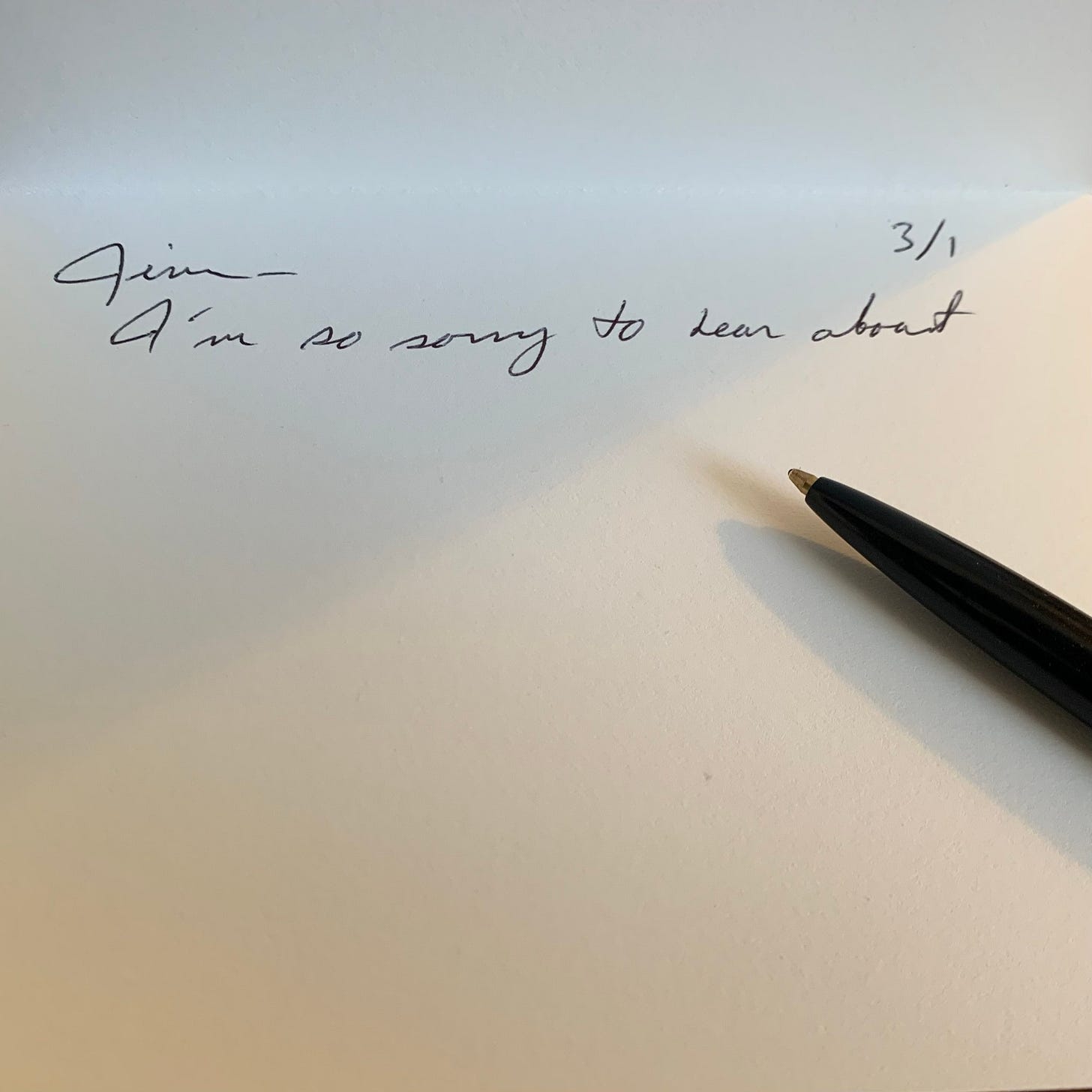Welcome back! (or welcome)!
Several of you are new to this weekly newsletter. Each week, I draw on my experiences and research as a hospital chaplain, writer, teacher, and human to give you tools and stories as you help others in hard times.
Last week, I talked to you as friends who were walking through deep loss. I’m grateful for the response I’ve heard.
This week, I’m talking about a time I wasn’t paying attention.
+++
A reflection on stopping to notice the death in the room.
Recently, a friend sent me a text. Actually, it was a series of texts. It started with, “I have a question, but I don’t know if there is a simple answer.”
I read the texts.
I replied.
I went back to the other projects I was working on.
At its core, the question was, “When everyone around is hurting, how do I know who to care about and for?”
When we can read about all the struggles and pain and hospitalizations and frustrations people are experiencing, we can feel overwhelmed. Our sympathy or empathy or compassion can overflow. Some of us are particularly attuned to the pain others feel. Some of us are particularly attuned to injustices. (Some of us mock or ignore those things. But that’s a different issue.)
I thought I gave my friend a helpful quick answer to the thoughtful texts.
More than a week later, I went back to his question. I wanted to think about it and even write to you about it, because it was a good question.
When I started writing, I realized a deeply significant fact that my quick answer had overlooked.
In the last two months, my friend’s coworker died suddenly in a car accident. It was, by all measures, a tragic event. And in that moment, my friend lost someone he saw every day. So when he wrote to me about feeling overwhelmed with the pain of others, it was his heart that was broken. Which left his already sensitive heart and soul open to every grief pathogen in the air.
This story is a bit about my friend.
This story is more about me.
I think best with fingers on a keyboard, not thumbs on a screen. And I think best when I turn from busyness.
If I don’t take the time to honestly and quietly write, I’m not going to find the most helpful thoughts for others, because I’m not going to be able to think through what is going on. I’m not going to see the pain or the situation or the contributing factors.
In this case, I missed the death in the room.
Here, of course, there is a connection back to my friend’s question. How do I know who to care for?
I cannot provide direct care for everyone, and neither can you.
As I write, a friend is in surgery, a friend has a hospitalized family member, a friend has had three deaths in the last six weeks, a friend is facing a year with deaths. As I write, you are a week or a year or a decade out from a death that shapes your heart – some I know about and some I don’t.
Though I can care about all those situations, I cannot care for each of those people. As much as our empathy or our sense of obligation or our skills at caring may draft endless should-do lists, those lists needn’t overtake us.
In the case of this friend, I need to schedule coffee; in another, I can send a text. In other cases, I can simply be grateful that there are people closer than I am. For other people, I can write suggestions or offer coaching.
Like reminding my friend of his own continuing deep grief.
So do what you are prompted to do. Send a text when a name comes to mind. Send a note. Send a check for $1000. Worry less about what would be nice. Do what you are built and called to do and release trying to be someone else. Be a body of presence if you are THE body that needs to be present. Know how you think best and do more of that.
And if you just remembered someone to reach out to, do it before you forget.
You’re welcome.
+++
Finding Words in Hard Times - the podcast is back.
This week, you don’t need to be strong for anyone else.
Most of us have been told that we need to be strong at the time of loss. We hear a voice telling us to be strong for the kids, for our mom, for the family. But what if we don’t need to be strong for anyone?
This week I’ll talk about that and read a chapter from This is Hard: What I say when loved ones die.
Because in times of loss, you don’t have to tough it out. Not if I’m your chaplain, anyway.
Watch on YouTube
Listen on Apple Podcast
+++
Thanks for stopping by.
See you next week.
Let me know how this is helpful.
Jon
+++
This newsletter is supported by readers like you. If you find these weekly newsletters and the podcast helpful, I invite you to join those supporting readers. Go to buymeacoffee.com/socialmediachaplain and become a one time supporter or monthly supporter.





